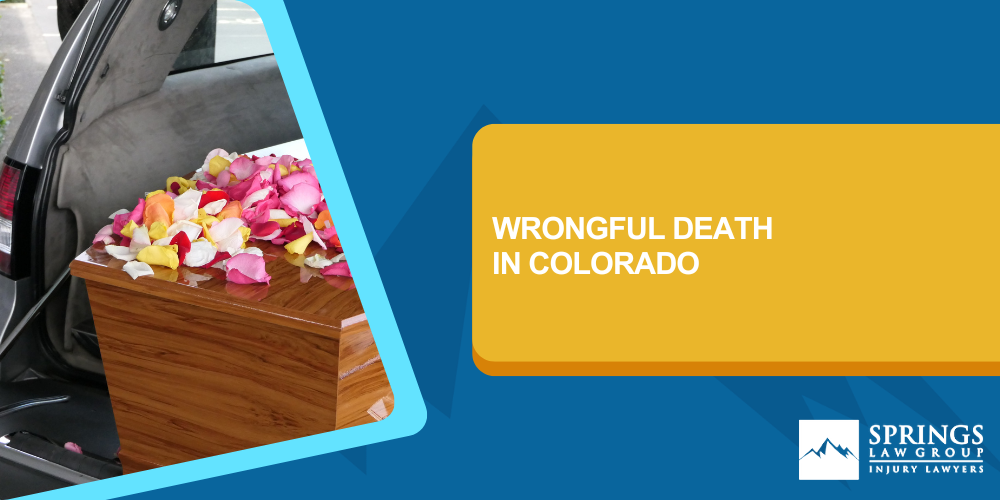Wrongful Death In Colorado

Wrongful Death Statute
In Colorado, wrongful death claims are governed by statute. The statute states who may bring claims, how much they can recover, when claims can be filed, and who may actually receive the money.
Wrongful Death Defined
A “wrongful death” occurs when a person’s death is caused by the wrongful act, neglect, or default of another. Wrongful death includes intentional killings as well as accidental killings. Auto accidents are a common cause of wrongful death claims in Colorado. One of the more famous wrongful death claim was brought against O.J. Simpson by the family of Nicole Brown Simpson and Ron Goldman in 1997.
Who May Bring a Wrongful Death Action
Under Colorado law, when a loved one is killed by another’s careless or intentional act, the law only allows certain people to make a wrongful death claim, and it depends on each person’s relationship to the deceased. If the person who died (the “decedent”) was married, then his or her spouse can bring a wrongful death action. If the spouse elects not to file a wrongful death action, then the decedent’s “heirs”—lineal descendants, such as children and grandchildren—can bring the wrongful death action. Brother, sisters, aunts, and uncles usually cannot make a wrongful death claim. The parents of a deceased person can bring a wrongful death action if the decedent was an unmarried adult or a minor who had no children. “Heirs,” as used in the statute, does not necessarily carry the same meaning as that word does in other legal contexts.
Colorado law provides that the parent of a fetus cannot bring a wrongful death action unless the fetus is born before it dies. However, the fetus does not need to be viable for the death to trigger a wrongful death claim by the parents. Note that there are other claims you may bring for injuries causing the death or termination of a fetus that is not born, but those are beyond the scope of this article.
Timing To Bring A Wrongful Death Claim
During first year after death of the decedent, if the decedent was married at time of death, only his or her spouse can bring a wrongful death action. If, after one year, the spouse has not filed, then the heirs can file an action. If the decedent was not married at time of death, then his or her heirs can immediately file a claim.
Damages From A Wrongful Death Case
Three types of damages can be recovered in a wrongful death action: economic, non-economic, and solatium damages. Recoverable economic damages include the decedent’s wages lost over his or her expected work life due to the wrongful death and funeral expenses.
Non-economic damages, such as grief, sorrow, and loss of companionship, are also recoverable. However, in Colorado, they are subject to a “cap” or limit, which is adjusted for inflation. At the time of the publication of this article, they are capped at $437,070.00. There is an exception to this limit, however, when the death was the result of a “felonious killing,” which means the killing would be considered a first- or second-degree murder or a manslaughter.
Solatium damages are an option the wrongful death plaintiff can choose instead of traditional non-economic damages. Solatium is a set amount adjusted for inflation, currently $87,210. One advantage of solatium damages for the plaintiff is that they are not offset or reduced where the decedent was partially at fault for the incident that caused his or her own death.
Medical Expenses Following A Wrongful Death Claim
Medical expenses cannot be recovered in a wrongful death action. If the incident that caused a wrongful death caused decedent to incur medical expenses prior to his or her death, then the proper way to recover those damages would be through a “survival” action, which is different than a wrongful death action. A survival action is brought by the personal representative of the decedent’s estate against the person who caused the wrongful death. It allows the estate to recover the economic damages that arose between the time of the injury and the time of death. The plaintiff in a survival action cannot recover damages for pain, suffering, disfigurement, loss of enjoyment of life, and loss of future income because they do not “survive” the decedent’s death.
Conclusion
Wrongful deaths are extremely tragic, emotional events in the lives of the deceased’s family and friends. While a life cannot be measured in dollars, a wrongful death action may help a family by providing compensation to spouses and descendants left behind. Hiring an experienced wrongful death attorney can help you navigate the complicated process and alleviate the burdens associated with such claims.
At Springs Law Group, we offer free consultations and are ready and willing to help the families of those who have been tragically and wrongfully killed by another’s careless or intentional acts. We would be honored to meet with your family to discuss the options and remedies available under Colorado law. Contact us online or call us directly at 719.421.7141.
